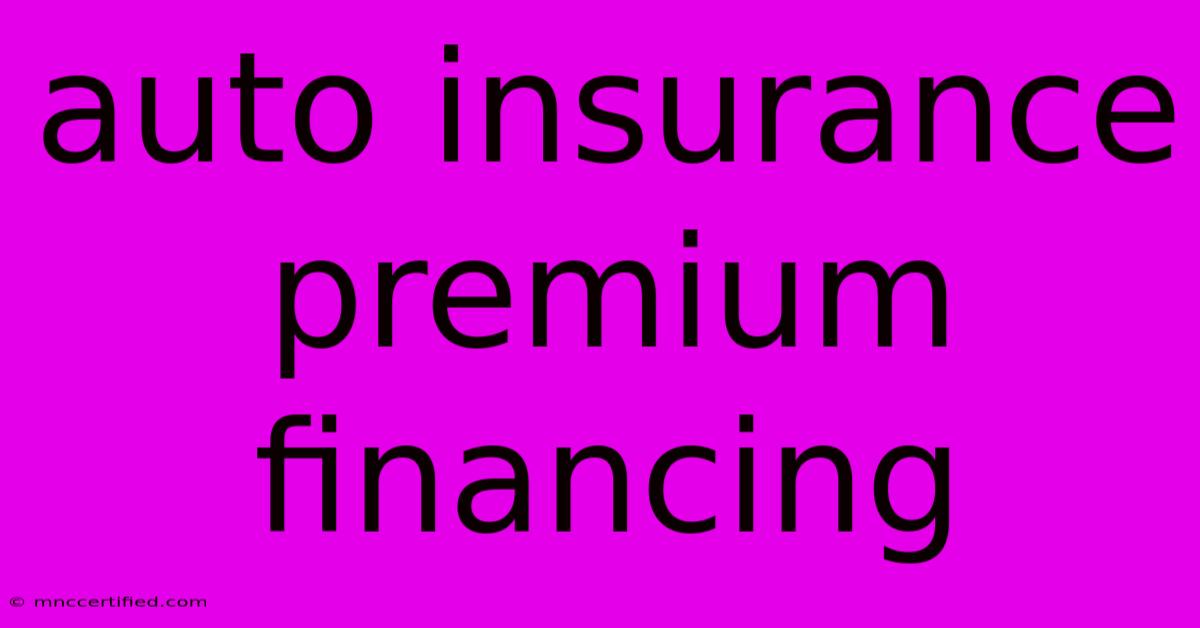Auto Insurance Premium Financing

Table of Contents
Auto Insurance Premium Financing: A Comprehensive Guide
Are you struggling to afford your auto insurance premium upfront? Many people find themselves in this situation, especially when facing higher premiums due to factors like age, driving record, or the type of vehicle. Fortunately, auto insurance premium financing offers a solution, allowing you to pay your insurance premiums in installments instead of a single lump sum. This guide delves into the intricacies of premium financing, exploring its benefits, drawbacks, and how to choose the right option for your needs.
What is Auto Insurance Premium Financing?
Auto insurance premium financing is a short-term loan specifically designed to cover the cost of your auto insurance premium. Instead of paying your insurer directly, you obtain a loan from a financing company, which then pays your insurance company on your behalf. You then repay the loan in monthly installments, usually over a period of six to twelve months. Think of it as a payment plan for your insurance, giving you more manageable financial flexibility.
Key Players in Auto Insurance Premium Financing:
- The Insurer: Your insurance company receives the full premium payment from the financing company. They are not involved in the loan agreement between you and the financing company.
- The Financing Company: This is the lender providing the loan. They set the terms of the loan, including interest rates and repayment schedules. These companies can range from banks and credit unions to specialized insurance premium financing companies.
- The Policyholder (You): You are responsible for repaying the loan to the financing company, including any interest charges.
Benefits of Auto Insurance Premium Financing
- Improved Cash Flow: The most significant advantage is the ability to manage your finances more effectively. Paying in installments reduces the immediate financial burden.
- Avoids Policy Lapses: Failing to pay your premium on time can lead to policy cancellation, leaving you uninsured. Premium financing helps avoid this risk.
- Convenience: It simplifies the payment process, consolidating your insurance payment into manageable monthly installments.
- Potential for Building Credit: For some, timely repayment of the loan can positively impact their credit score.
Drawbacks of Auto Insurance Premium Financing
- Interest Charges: You will pay interest on the loan, increasing the overall cost of your insurance. This is the primary disadvantage. Carefully compare interest rates from different lenders.
- Additional Fees: Some lenders may charge origination fees or other administrative costs.
- Risk of Default: Failure to make timely payments can result in penalties, further increasing the cost, and potentially harming your credit score.
- Not Suitable for Everyone: Individuals with poor credit history may find it difficult to secure a loan or may face higher interest rates.
Choosing the Right Auto Insurance Premium Financing Plan
Selecting the right premium financing plan involves careful consideration of several factors:
- Interest Rates: Compare interest rates from multiple lenders to find the most competitive option.
- Loan Terms: Examine the repayment period (typically 6-12 months) and ensure it aligns with your budget.
- Fees: Be aware of any additional fees, such as origination fees or late payment penalties.
- Reputation of the Lender: Choose a reputable lender with a proven track record of fair and transparent practices.
- Credit Check: Be prepared for a credit check as lenders assess your creditworthiness.
Alternatives to Auto Insurance Premium Financing
Before opting for premium financing, consider alternatives:
- Budgeting and Savings: Adjust your budget to save enough for the premium upfront.
- Payment Plans with Your Insurer: Some insurance companies offer their own payment plans with potentially more favorable terms than third-party lenders.
Frequently Asked Questions (FAQs)
Q: Can I get premium financing if I have bad credit? A: It's possible, but you'll likely face higher interest rates or stricter loan terms.
Q: How long does it take to get approved for auto insurance premium financing? A: Approval times vary depending on the lender but are generally quite quick.
Q: What happens if I miss a payment? A: Late payments will likely result in late fees and potentially impact your credit score. Contact your lender immediately if you anticipate difficulties making a payment.
Conclusion
Auto insurance premium financing can be a valuable tool for managing your insurance costs, providing financial flexibility and preventing policy lapses. However, it’s crucial to weigh the benefits against the potential drawbacks, carefully compare options from different lenders, and ensure you can comfortably manage the monthly repayments. Thorough research and responsible borrowing are key to making an informed decision. Remember to always read the fine print and understand all terms and conditions before signing any agreement.

Thank you for visiting our website wich cover about Auto Insurance Premium Financing. We hope the information provided has been useful to you. Feel free to contact us if you have any questions or need further assistance. See you next time and dont miss to bookmark.
Featured Posts
-
I M A Celeb Richard Coles Past Lie
Nov 22, 2024
-
20 Years Of Dic Middle East Impact
Nov 22, 2024
-
Laos Methanol Poisoning Another Tourist Dead
Nov 22, 2024
-
New Authority Trucking Insurance
Nov 22, 2024
-
Lewis To Colorado 247 Rating Stats
Nov 22, 2024